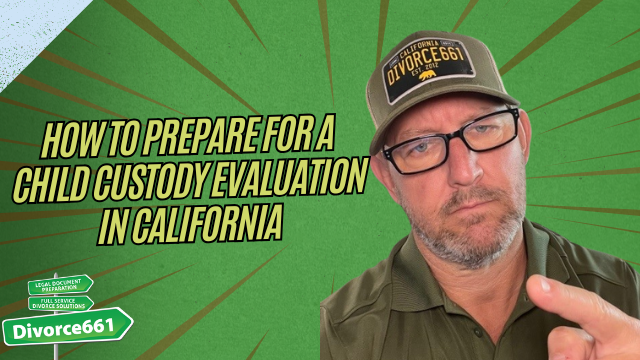How to Prepare for a Child Custody Evaluation in California
Facing a child custody evaluation can feel overwhelming. If parents cannot agree on a custody arrangement, the court may order a custody evaluation. A court-appointed evaluator will review home environments, parenting styles, and each parent’s ability to meet the child’s needs, then recommend what is in the child’s best interest. With the right preparation, you can present yourself confidently and show you are focused on your child’s wellbeing.
What a Custody Evaluator Looks For
Evaluators are not looking to punish parents or “win” a battle. Their job is to gather information and make recommendations that serve the child’s best interest. Typical areas they examine include:
- Home environment and stability
- Parenting style and discipline approaches
- Daily involvement in the child’s routines and activities
- Communication skills and ability to co-parent
- Emotional and physical ability to meet the child’s needs
Common Misconception: Income Is Not the Deciding Factor
Many parents worry that income or financial status will determine custody. While financial stability matters, evaluators focus more on practical, day-to-day factors: who provides consistent care, how stable each parent’s home is, how well parents communicate, and whether the child’s emotional and developmental needs are met. You do not lose points solely because of income.
Real Client Story
One client in Los Angeles came to me convinced their lower income would hurt their custody evaluation. We walked through what evaluators actually care about — routine, involvement, clear communication, and a stable environment — and prepared evidence of the client’s daily parenting responsibilities. After preparation, the client felt confident and the evaluator recognized their strengths as a parent. The outcome showed that demonstrating stability and involvement mattered more than the paycheck.
How to Prepare: A Practical Checklist
Preparation is about organization, clarity, and showing you are child-focused. Use this checklist to get ready for your custody evaluation.
- Organize documentation: school records, medical records, schedules, extracurricular calendars, and any written communication demonstrating co-parenting or attempts to co-parent.
- Keep a daily routine: maintain consistent sleep, meal, homework, and activity routines so the evaluator sees stability.
- Record your involvement: keep a calendar of parenting time, drop offs, appointments, and who handled daily tasks.
- Be honest and calm: answer questions directly. Avoid blaming or badmouthing the other parent.
- Demonstrate communication skills: show examples of respectful communication or attempts to resolve conflicts without involving the child.
- Prepare your children: explain the process simply and reassure them you will support them. Do not put them in the middle.
- Dress appropriately and be punctual: first impressions matter. Arrive on time and present yourself as responsible and focused.
- Consider professional support: parenting classes, therapy, or letters from teachers or healthcare providers can support your case.
What to Expect During the Evaluation
Evaluations vary, but common elements include interviews with each parent, interviews with the child when appropriate, home visits, and review of documents. The evaluator may observe parent-child interactions and speak with third parties such as teachers, pediatricians, or therapists. Their report will typically make recommendations to the court about custody and visitation based on the child’s best interest.
How I Help Clients Prepare
At Divorce661, we guide clients through each step of the evaluation process. That includes explaining what evaluators prioritize, helping you gather and organize supporting documents, coaching you on how to present yourself, and building a clear narrative that focuses on the child’s needs. My goal is to make sure you walk into the evaluation informed, confident, and ready.
We will make sure you go in informed, confident, and ready.
Final Tips
- Focus on stability, routine, and the child’s best interest rather than winning a battle with the other parent.
- Be truthful and composed. Evaluators value honesty and emotional regulation.
- Keep records that demonstrate your day-to-day involvement and commitment to your child.
- If you need help preparing, reach out for a consultation so you are not doing this alone.
Need Help Preparing?
If you are facing a child custody evaluation in California and want help getting ready, visit https://divorce661.com to schedule a free consultation. With preparation and the right support, you can present your strengths as a parent and focus on what matters most: your child’s wellbeing.


